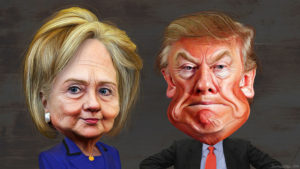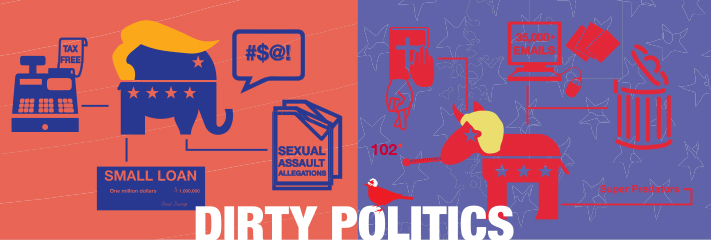This is the first time the battle of the sexes coincides with the battle for the White House and voters are taking notice.
Come November 9, America will have made history: The first female president or the first president to have hosted “The Apprentice.” Neither side has been spared from the onslaught of scandals. One after another, the papers are filled with headlines grossing “firsts,” “male,” “female,” “Democrat,” “Republican” and so on. Some more crass than others.
Back in early June of 2015 when “The Donald” announced his campaign, he became known for his ‘off-the-cuff’ personality. Later dubbed “Teflon Don,” Trump would seemingly deflect media criticism and used his charisma to incorporate the concept of media bias into his platform as a political outsider.
Clinton faced an early presumptive nomination for the Democratic Party. Popular millennial figure, Democratic-Socialist and new overall democrat Bernie Sanders inspired a sizeable population to challenge her along the campaign trail, forcing concessions where able; making history for the candidate with the largest number of individual donors in any presidential political campaign.
From stage to speech, the candidates exuded behaviors and tackled probing questions from debate moderators Anderson Cooper and Martha Raddatz in what some may have considered an uncomfortable first fifteen minutes.

The dynamic consisted of Trump often standing, seemingly towering over Hillary while he was unreserved in his emotional expression when juxtaposed to Clinton’s stoicism. The response to an unprecedented dynamic between candidates may factor into the election results.
Trump shot to further his appeal to his base and hope to gain on independent voters in swing states like Ohio, where on October 13 he had hosted a rally in Cincinnati with some 21,000 attendees. Similarly, Clinton held a sizeable rally in Columbus just a few days prior—a larger turnout than previously record low attendance at another Ohio event that garnered media coverage and web circulation.
The political atmosphere has centered, like the second presidential debate, heavily around gendered issues. At least two women have come forward with sexual assault claims, which fall in line with Trump’s “locker room” audio where he states that around pretty women, he ‘just’ kisses them. Trump goes so far as to suggest his passion for women, whether in seriousness or jest, is comparable to how an alcoholic feels about alcohol.
Clinton also has her history with sexual assault. Clinton in 1975 was recorded laughing about her defense to an alleged child rapist. Clinton also lashed out at those that came forward about rape allegations towards her spouse and former President Bill Clinton. Clinton condemned Trump’s remarks on the stage and continues to do so on social media and at her campaign stops.
Clinton put forth her effort to appear authentic, emotional yet rational—a dynamic the first female president may have to prove to tap into the independent voting block.
Moderators did not ease on the other unresolved concerns many Americans feel towards both Trump and Clinton. After a plea of no admission of guilt, similar to Trump’s many settled lawsuits, there was an eventual topic change towards taxes.
Trump garnered national attention for his refusal to release his tax returns. After three pages were revealed indicating a loss of $916 million, Americans on the fence wanted answers. Although Trump is enduring an audit, the optics of keeping his taxes mostly obscured for most of the election has had some marginal effect due to to the optics of it all.
The exact same methods for the legal way in which Trump avoided income taxation was used by Clinton, herself.
The difference in this election is that between all the tit-for-tat, insults and hypocrisy that the public may be familiar with, the scope that America uses to perceive the events as they unfold is one that includes ideas of gender, power and society at its core– and it is one that there lies less experience in applying at the voting booth.
Barton Kleen
Executive Editor


